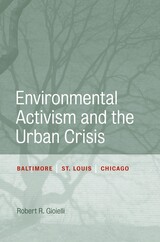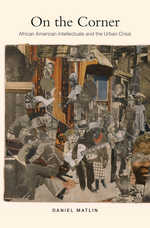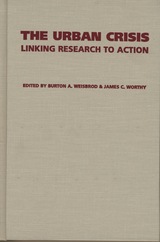

Environmental Activism and the Urban Crisis focuses on the wave of environmental activism and grassroots movements that swept through America's older, industrial cities during the late 1960s and early 1970s. Robert Gioielli offers incisive case studies of Baltimore, St. Louis, and Chicago to show how urban activism developed as an impassioned response to a host of racial, social, and political conflicts. As deindustrialization, urban renewal, and suburbanization caused the decline of the urban environment, residents--primarily African Americans and working-class whites--organized to protect their families and communities from health threats and environmental destruction.
Gioielli examines various groups' activism in response to specific environmental problems caused by the urban crisis in each city. In doing so, he forms concrete connections between environmentalism, the African American freedom struggle, and various urban social movements such as highway protests in Baltimore and air pollution activism in Chicago. Eventually, the efforts of these activists paved the way for the emergence of a new movement-environmental justice.

In a society which has made "urban crisis" a phrase peculiarly its own, it is strange how many different meanings are assigned to those two words. The theme of this book is that it is more important to disentangle and analyze the various problems which are indiscriminately referred to by this phrase than simply to issue a call to arms. To paraphrase the editor of The Metropolitan Enigma, James Q. Wilson, not everything about cities constitutes a problem and not all problems to be found in cities are distinctively "urban." This book seeks to explore the complexities and clear away the easy generalizations that prevent an understanding of the human problems of an urbanizing nation.
The essays in this book were written by Daniel P. Moynihan (Poverty in Cities), Bernard J. Frieden (Housing and National Urban Goals), Edward C. Banfield (Rioting Mainly for Fun and Profit), and other perceptive students of American society. Some of the papers reveal unexpected findings; others take an unusual perspective; each provides a fresh and lucid treatment of a difficult subject. No effort has been made to produce a work animated by a single point of view. A central idea of The Metropolitan Enigma is that there is no all-embracing strategy that can be put forward as an effective solution for the "urban crisis." Directed to everyone who is interested in the future of the American city, this is an important and valuable book.
The volume was first published in a soft-cover edition by the Task Force on Economic Growth and Opportunity of the United States Chamber of Commerce in 1966. The Joint Center for Urban Studies of M.I.T. and Harvard commissioned the articles. Each of the contributors has had an opportunity to revise his paper, and several essays have been substantially rewritten. Edward Banfield's essay appears here for the first time.

In July 1964, after a decade of intense media focus on civil rights protest in the Jim Crow South, a riot in Harlem abruptly shifted attention to the urban crisis embroiling America's northern cities. On the Corner revisits the volatile moment when African American intellectuals were thrust into the spotlight as indigenous interpreters of black urban life to white America, and examines how three figures--Kenneth B. Clark, Amiri Baraka, and Romare Bearden--wrestled with the opportunities and dilemmas their heightened public statures entailed. Daniel Matlin locates in the 1960s a new dynamic that has continued to shape African American intellectual practice to the present day, as black urban communities became the chief objects of black intellectuals' perceived social obligations.
Black scholars and artists offered sharply contrasting representations of black urban life and vied to establish their authority as indigenous interpreters. As a psychologist, Clark placed his faith in the ability of the social sciences to diagnose the damage caused by racism and poverty. Baraka sought to channel black fury and violence into essays, poems, and plays. Meanwhile, Bearden wished his collages to contest portrayals of black urban life as dominated by misery, anger, and dysfunction.
In time, each of these figures concluded that their role as interpreters for white America placed dangerous constraints on black intellectual practice. The condition of entry into the public sphere for African American intellectuals in the post-civil rights era has been confinement to what Clark called "the topic that is reserved for blacks."

READERS
Browse our collection.
PUBLISHERS
See BiblioVault's publisher services.
STUDENT SERVICES
Files for college accessibility offices.
UChicago Accessibility Resources
home | accessibility | search | about | contact us
BiblioVault ® 2001 - 2024
The University of Chicago Press









